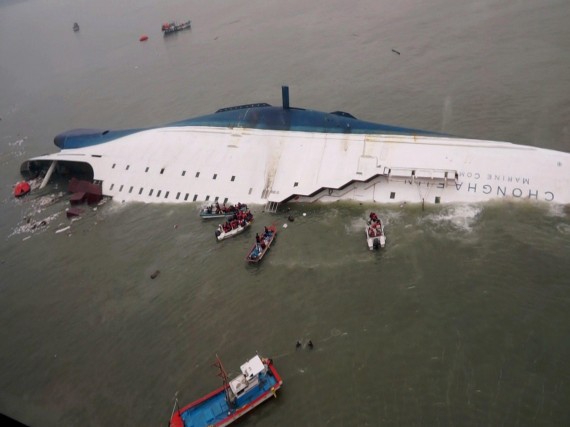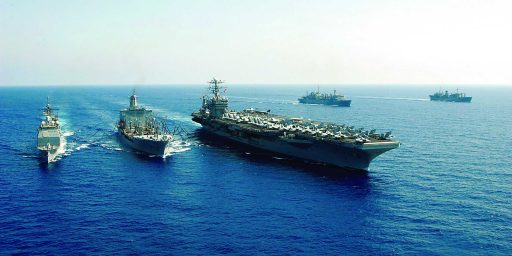Whatever Happened To The Captain Going Down With The Ship?
Cowardice. There really isn't any other word for it.
Just two days ago, a ferry carrying hundreds of South Korean school children capsized on its way to an island known as “the Hawaii of Korea.” So far, there are about three dozen people confirmed dead, but hundreds of children remain missing, either trapped aboard ship in an air pocket that isn’t likely to last much longer, or already dead. One thing that’s getting a lot of attention both here and Korea, though, is the fact that the ship’s captain acted in a manner that most of us would consider cowardly:
Ever since the Titanic sank on its maiden voyage, carrying its captain and many of the passengers with it, the notion that the captain goes down with his ship has been ingrained in popular culture.
But now, for the second time in just over two years, a sea captain — first in Italy and now in South Korea — has been among the first to flee a sinking vessel, placing his own life ahead of those of his terrified passengers.
A much-publicized photo from the latest accident shows the Korean captain being helped off his own ship, the Sewol, stepping off the deck to safety even as scores of his ferry passengers remained below where survivors believe they became trapped by rushing water and debris.
The behavior has earned the captain, Lee Jun-seok, 69, the nickname the “evil of the Sewol” among bloggers in South Korea. It also landed him in jail.
Maritime experts called the abandonment shocking — violating a proud international (and South Korean) tradition of stewardship based at least as much on accepted codes of behavior as by law.
“That guy’s an embarrassment to anybody who’s ever had command at sea,” said John B. Padgett III, a retired United States Navy rear admiral and former submarine captain.
His sentiments were echoed by Capt. William H. Doherty, who has commanded Navy and merchant ships and managed safety operations at a major cruise line. He called Mr. Lee’s decision to leave his 447 passengers “a disgrace,” and likened it to the desertion of the stricken Costa Concordia cruise ship off the Italian coast in 2012. “You can’t take responsibility, or say you do, for nearly 500 souls, and then be the first in the lifeboat,” he said.
The Italian Captain is on trial for manslaughter, but the charges against him are directly related to abandoning ship while it was sinking rather than supervising the escape and rescue of the passengers. As it turns out, though, the rules about what a Captain must or should do when a ship is so endangered that it becomes necessary to evacuate aren’t entirely formal:
Most countries do not explicitly state that a captain must be the last person to leave a distressed ship, experts say, giving captains the leeway to board lifeboats or nearby ships if they can better command an evacuation from there. South Korea’s law, however, appears to be explicit, allowing authorities to arrest Mr. Lee for abandoning the boat and its passengers in a time of crisis. An international maritime treaty known as the Safety of Life at Sea — first adopted in 1914 after the Titanic disaster — makes a ship’s captain responsible for the safety of his vessel and everyone on board. It also says that passengers should be able to evacuate within 30 minutes of a general alarm.
The Sewol took two and a half hours to sink, but many survivors have reported that the crew told passengers it was safer to stay put inside the ship, likely dooming them. (The captain says he later issued instructions for passengers to evacuate the ship, but it remains unclear if that was conveyed to passengers.)
The United States Navy’s rules are more explicit than ones for commercial ships. Dave Werner, Naval History and Heritage Command spokesman, said that Navy rules dating back to 1814 require a captain to remain with a stricken ship as long as possible and salvage as much of it as he can.
Mr. Werner cited current regulations that state, “If it becomes necessary to abandon the ship, the commanding officer should be the last person to leave.”
One would think that would be something that every ship captain, whether in the Navy or not, would think of not just as a rule but as something that a decent human being would do.
Obviously, the actions of two men aren’t necessarily a reflection on ship captains as a whole. Indeed, the fact that most of the people in that line of work who have commented publicly about either one of these incidents have condemned their actions seems to demonstrate that they are not representative of captains everywhere. At the same time, though, you have to wonder what kind of culture would create a person as callous toward others as these two men quite obviously were. The human instinct for self-preservation is quite strong, but so is the instinct to help others in need. Examples of this kind of heroism can be found in the 9/11 tragedy, the Boston Marathon bombing, and the shooting at Sandy Hook Elementary School in December 2012. Perhaps that’s why examples such as what Captain Lee did off the coast of South Korea stand out so starkly. Most of us would like to think that we’d act heroically in similar situations, and when we come across an example of someone acting with such abject cowardice, perhaps it hits a little to close to home.







A libertarian preaching to others about selfishness. Are you deliberately trying to have your photo placed in a dictionary next to the word “chutzpah”?
Dead on. I hope that I would have to the personal strength to act courageously if confronted with a difficult and dire situation. Until one is tested, you just don’t know.
People want the perks of being ship’s master without the responsibilities. The only brave people we’re seeing in any of this are the divers, whom (I can tell you from personal experience) are willingly jumping into an exceedingly dangerous situation. Death rates under such conditions are up to forty times greater than the occupational average.
Worse still, the captain took off with the helmsman and the mate that were on duty at the time. http://www.nytimes.com/2014/04/20/world/asia/pilot-steering-ferry-had-no-experience-in-treacherous-waterway.html?hp&pagewanted=all
A 69 year-old man who places his own survival ahead of that of children is a disgrace no matter the circumstances. It doesn’t just violate the traditions of the sea, it violates the essential human imperative. I think coward is the right word.
Doug- What would Ayn Rand say about this?
Steve
@steve:
I think we all know the answer to this one. It’s a good thing that Doug isn’t a thoroughgoing libertarian. Means he’s a better human being for it.
I wish more CEOs would be willing to “go down with the ship”.
Obviously stupid questions since nobody’s done it, but why can’t they flip the boat over or just lift it up out of the water?
The bigger screw up was not accepting a straight forward fact, the ship was lost. He was afraid people would get hurt if he ordered it. Clinging to a notion there always is a perfect solution is allowing fear of personal disgrace to influence judgement. Just as cowardly, really.
As far as leaving goes, I suspect these guys did it because they knew they were completely useless where they were as much as anything else. Past a certain point of heel you can’t move. Floors are not meant to be climbed.
Wow, a lot of people throwing around the word “coward” here. I wonder how many have actually looked death in the face and said, “If that’s what it takes….” Truth is, the bravest thing most of you have ever done is cross the street in rush hour traffic. We live in a world where death is mostly distant, the closest we get is when somebody we know didn’t beat cancer and we look upon their lifeless body covered in make-up and lying in a silk lined coffin, and we say, “They look so natural.”
Bullsh!t. That is not natural in any way shape or form.
I was on a cave rescue once and as I was walking up to the cave they were bringing the first body down. My first thought was “Jeezus, it’s just kids.” My 2nd thought was, “Wow, even blacks turn blue when they drown.” I remember standing at the entrance of the cave and it was pumping as much water as a dozen fire hydrants and the electricity of the moment pumped me up like no cave ever had before. I could hardly wait to go in. The fireman at the entrance doing entrance control, his face was as white as a sheet. All that water scared the sh!t out of him. But I could also see naked envy on his face. Every bone of his body was screaming to go with us, but his Captain had said, “Only the cavers.”
There were predictions of more thunder storms, the cave was already in flood, if another storm hit? We were dead. But caving was what we did. There were still people in the cave and we had a chance to be heroes. So, we couldn’t wait and in we went.
In the end, 6 dead children were pulled out of that cave, and both their adult counselors, one kid survived. When it was over I vowed, “Never again.” Not because I had done anything so terrifying, or because I had had to do something really horrible, but because through out, my emotions were all over the place, and in the end, the best thing I did was convince the Chief to allow one more team to go in by another entrance because, “Desperate people do desperate things.” And even that made not one whits worth of difference.
On 2 other occasions I have faced death underground and I am happy to say I measured up and saved a buddies life the one time, and on the other I saved mine.
I also happened to once dive out into rush hour traffic on rain slickened streets to tackle a 4 yr old boy chasing a ball (I remember headlights and car horns, and thinking my son was dead. Strangely enough, I never had the same thought about myself)
After all this, I still don’t know how I would react the next time. I might freeze up. I don’t know.
Neither do any of you.
@OzarkHillbilly:
It’s true that I don’t know how I’d behave. I’ve been brave enough on occasion but that’s no guarantee. But that doesn’t change my judgment. Had I behaved as the captain did, I’d be a coward. As he was.
@Andrew E.: If there are air spaces keeping people alive, then flipping the boat could potentially flood them. The motion itself could kill as they get thrown around, but at this point I’d probably risk it.
If you want to call yourself Captain you had better be prepared to give your life saving the passengers on your ship. If you can’t do that, don’t take the big job.
@steve:
Actually, Rand did discuss this, rather explicitly. She talked about “lifeboat ethics” — situations where normal behavioral rules are discarded because of emergencies, or lack of information, or other problems. If she had been on the Titanic, she said, she would have killed others without mercy to obtain a seat in a lifeboat — not for herself, but to save her husband.
So. You can argue with her position, but don’t say she refused to think about it.
@mike shupp: The same husband she didn’t think twice about committing adultery on?
Situational ethics, indeed.
The captain ran. This young woman did not.
Ferry hero gave life to save others
@OzarkHillbilly:
I think there’s a huge difference between “he froze up or panicked in the crucial moment” and “he consciously decided, with ample time to choose otherwise, to abandon the ship”. Calling the former cowardice would be completely wrong-headed (and, in my opinion, akin to calling people with PTSD cowards – we can’t always control what our brains do under stress). Calling the latter cowardice, though, is fair game, I think.
@OzarkHillbilly:
It is hard to say what you would do until you’ve done it. In the few situations I have been in the danger I was putting myself in didn’t occur to me, training kicked in and I just acted until the situation was in hand. After the fact, I thought about the situation I had put myself in. Of course I was younger and less risk averse then than now. Then I would have done similar things for fun, now not so much.
I get where Ozark is coming from, but If being a ship captain in an emergency is remotely comparable to dashing out in the street to save a kid from being run over, somebody really messed up.
Professionals drill emergency situations constantly to prevent that lock-up and other fear-driven thought processes, an accomplishment that is not exceptional, not standard, sub-standard, or marginal. It is a minimum qualification. Not ordering the abandon ship in a timely manner must have been a mental state of denial. Denial is fear. That is where we have clear evidence of cowardice right now.
Seppuku by making sure he dies with the ship may be “courage” to some, but is it really? Perhaps the greater good is achieved by facing the humiliation and being around to help everybody figure out what happened. We were not there. We have no way of knowing if there was anything him, an old man, sticking around any longer would have saved anyone’s life, yet there seems to be some assumption it would have.
@dazedandconfused: I remember a historian, possibly Morison, talking about that difference in US and Japanese naval tradition. The Japanese captain went down with the ship, depriving the country of an experienced officer. The US captain supervised the evacuation and left the ship, even more experienced and more determined to get those SOBs next time.
@gVOR08:
I don’t think anyone here is claiming that a captain should literally go down with the ship as an act of “noble” suicide. What people are arguing is that the captain should stay aboard until the last possible moment – even though that entails significant personal risk of getting trapped and going down – in order to be maximally aware of and able to assist in the evacuation. There are occasions when that can be better done from a lifeboat, but I’m guessing those occasions are relatively rare. There’s a rather large grey area between standing silently at attention on the bridge while the water rises around you and jumping in a lifeboat hours before the ship sinks while hundreds of passengers are still aboard.
@R. Dave:
This is what he should have done. The ship’s captain must provide leadership in an emergency. Even seeing him still aboard would give focus to the crew and calm the passengers. But in this case the captain and senior crew–all the leadership–fled immediately. Even if it weren’t an act of rank cowardice–which it was–it would still be an utter dereliction of duty.
If the captain didn’t have the knowledge and training required to handle a situation like this, he was incompetent and his employers doubly so.